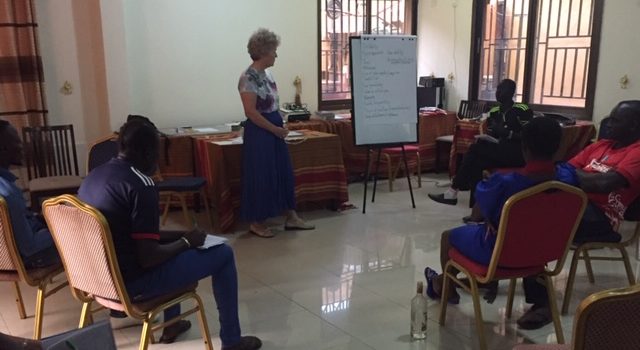
Network for Africa’s psychotherapist duo, Dr Barbara Bauer and Shelly Evans, have been working with front-line staff in South Sudan, one of the world’s most challenging places. Barbara and Shelly, who give their time to Network for Africa on a pro bono basis, spent 10 days in Juba, the capital, giving trauma counselling training to Non-Violent Peace Force personnel.
Challenges in South Sudan
South Sudan, the world’s newest country, gained independence in 2011. However, civil strife erupted shortly after, pitting rebel groups and government-aligned militias against each other. Millions have fled their homes, and an estimated 400,000 civilians have been killed.
The Non-Violent Peace Force provides unarmed staff to protect local people, identifying which roads and districts are currently dangerous, and accompanying women on their way to fetch water and firewood. Each year, thousands of women in African conflict zones are raped or killed as they perform these essential tasks. As Barbara commented,
We were training local South Sudanese people who live in the most dangerous places on earth. They go into risky situations each day, armed only with their voices. They also bring together the different sides to a conflict, lowering the temperature, and finding ways to resolve the problems. We were very conscious of how difficult and emotionally draining their work must be. Our training will help them keep themselves from burning out, as well as giving them skills to help the communities they live in.
Comprehensive Trauma Counselling Training
Over their years volunteering with Network for Africa, Barbara and Shelly have developed a comprehensive trauma counselling training programme with which they have trained front line staff in Uganda, Sierra Leone, and Rwanda. They have visited our project in Uganda eighteen times, building the capacity of local groups to provide trauma counselling to survivors of genocide and conflict. In South Sudan, they adapted their programme to the specific requirements of the Non-Violent Peace Force.
We Need Your Help
“The need there is enormous,” said Shelly. “The pressure on the local peacekeepers is extreme. They live in these communities, and they have no safe place to which they can retreat, to recharge their batteries. It’s important that we can teach them the techniques to manage their own mental well-being, as well as helping the survivors of conflict they are serving so bravely.”
To support Network for Africa’s work, please donate via our website. Thank you!